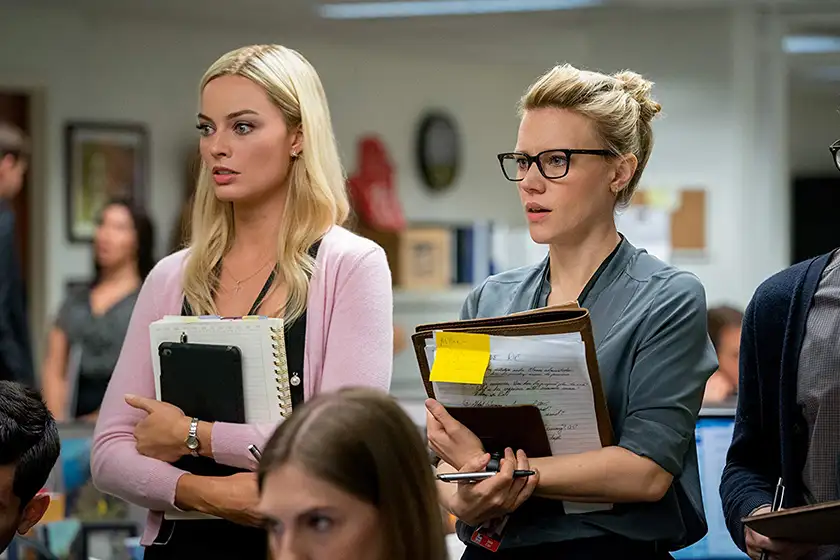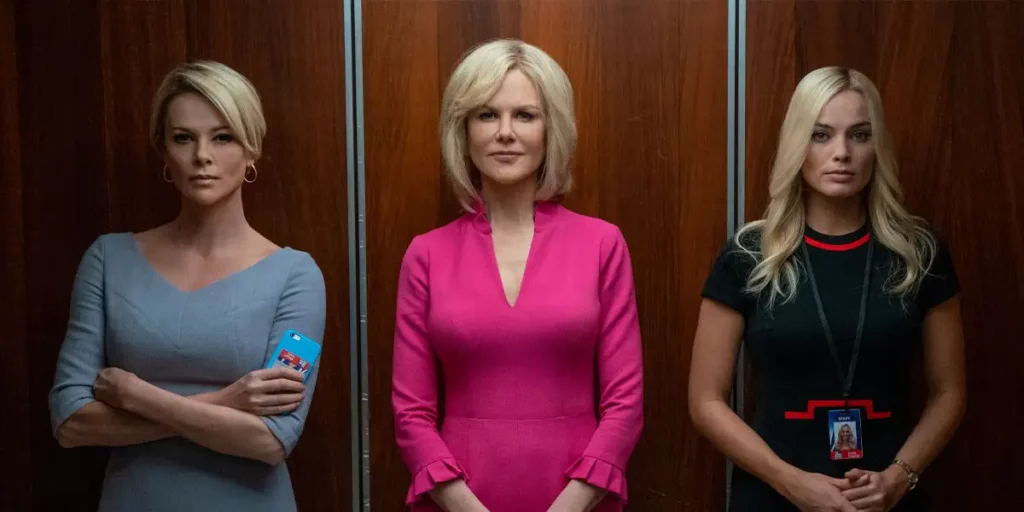In Bombshell, director Jay Roach tries to seam together a powerful MeToo tale of social criticism. Nevertheless, the film trips over itself and turns out to have no substantial contribution to make to its cause.
It’s no coincidence that Jay Roach’s Bombshell’s title has a word-play allure. From blasting pieces of news to atomic blondes, Roach’s latest drama lives up to marketing agencies’ expectations. The director delivers a dubiously entertaining piece of filmmaking for us to enjoy while we wonder if Margot Robbie will grab that statuette this time or fall into an early but night-dark DiCaprio pit of Oscars-engendered desperation. The MeToo movement has never been so glamorous. To the point that making it the subject matter of an Academy Award-nominated film doesn’t even hit front page anymore.
Bombshell is a docu-film, and, as such, it summarises the main events that lead to the deposition of Fox News’s top manager, Roger Ailes (John Lithgow) following sexual assault charges filed against him by a number of female employees and anchor women of the network. Interspersing conventionally-shot scenes with fairly recent archival footage dating back to President Trump’s first election campaign, the film follows three (staggeringly charming) women as they struggle through patriarchy and sexual discrimination and try to reach a floating plateau of relative stability and ease. Megyn Kelly (Charlize Theron), Gretchen Carlson (Nicole Kidman) and Kayla Pospisil (Margot Robbie) are bringing to the fore the unfair circular economy of butt-squeezing and dress-complimenting that paves women’s paths to the peak of their careers. And, to succeed, they’ll have to defy themselves first.
The MeToo hashtag was created in 2006, and since then it has played a pivotal role in helping people come to the fore and denounce the sick clockwork mechanism of power that besiege contemporary entertainment and corporate industry. Thanks to the MeToo movement, feminism has experienced a huge upsurge. It got us face the facts: the West was rushing headlong into a future of even more noticeable inequality, and someone had to speak out against the status quo. To address the protest, ensuing films revived screwball comedies, stripping them bare of all their funny bits and turning them into deadly serious dramas – a new kind of outraged battle of the sexes.
The average tale of women was therefore subordinated to male models, and accepted only insofar as it agreed to identify as the “anti-establishment” in the establishment algorithm. How many MeToo films have been directed by women? The answer is – I can’t even think of a single one of them. And Bombshell, which was directed by a man, sadly confirms this impression: its slick heroines conform to every (male) canon of feminine beauty from head to (high-heel clad) toe.

This might be good: these independent women know how the system works, and trick it for their own purposes. Or it might just be that a beautiful woman is always better than an ugly one – whereas the male actors are either well past their primes or never really got to blossom. And there’s no real way we can discern what the right interpretation might be. In fact, Bombshell leads the convoy of post-MeToo films: those which take the protest for granted, and do not really attempt to take sides in a more complex, way more compelling debate.
That being said, hats off to Robbie, who once again proves herself to be Hollywood’s jewel in the crown and effortlessly makes us fall in love with her every eyebrow movement and her every languid, liquid look. She really is Oscar-worthy. Only time will tell. Just as timing itself appears to be Bombshell’s fatal flaw. We can’t cry in unison to Kelly’s split-personality of caring mother and ruthless network climber, as much as we can’t empathise with Kayla’s conflicting will to please and self-love. We feel like we’ve already seen it all – in a bad way. We wish Bombshell could dig deeper and reveal some hidden depths of the human soul, which, evidently, wasn’t its goal.
Clearly, Roach’s film doesn’t strive for eternity. On the contrary, it presents us with a highly-specific bundle of time and place, which collides in a somewhat odd way with state-of-the-art reflection upon equality matters. It takes Bombshell only 1 hour and 49 minutes to erase what MeToo has been in the last few years, and it does so quite non-charmingly. Except for Trump’s election campaign, Bombshell is pure, unabashed anachronism. Here’s how to pack a film with praise-worthy intentions and bust them all. Here’s how a hallmark event of recent years gets turned into a bland piece of narrative – well-written, but speaking with a feeble voice.
Bombshell is now available to watch on digital and on demand.

